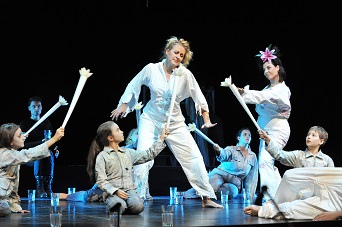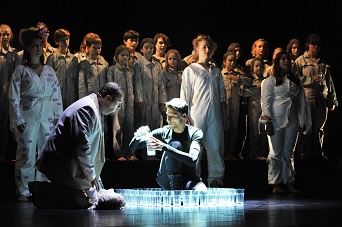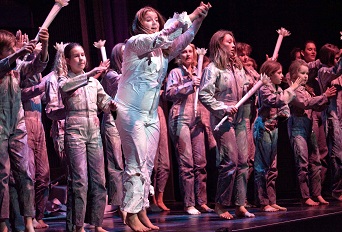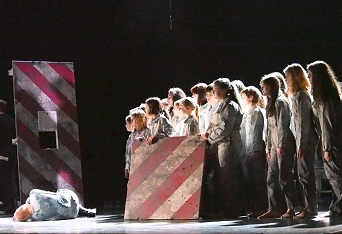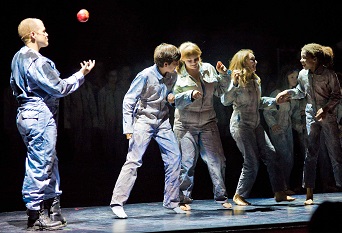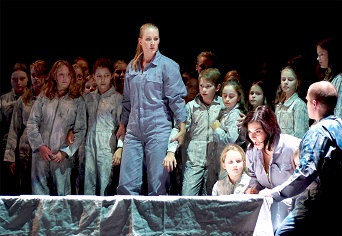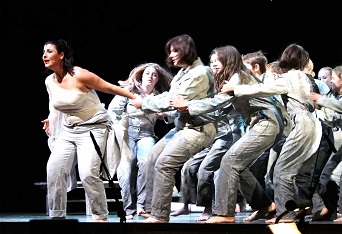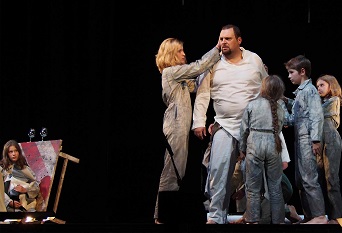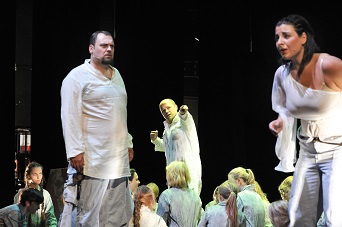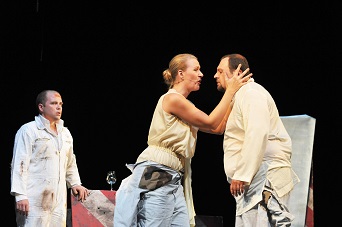2014 October 4rth
FLYING CARPET 2013 - ODYSSEY
Three Contemporary Short Operas
Music:
lotus: Sinem Altan (Turkey /Berlin)
the journey home: Amos Elkana (Israel/Tel Aviv)
omiros-orimos: Giorgos Koumendakis (Greece)
Premiere: 4 October 2013, 8:00 p.m., Gasteig, Carl Orff Hall, Munich
Further performances: 5/6 October 2013
Idea/Music. Conductor: Konstantia Gourzi
Director: Martina Veh
Assistant director: Caner Akdeniz
Stage/Costumes: Alexander Polzin
Set assistant: Claudia Weinhard
Lighting: Wieland Müller-Haslinger
Photos: Norbert Banik
Participants: Anna Stylianaki, Susanne Drexl, Aco Biscevic and Raphael Sigling,
Children's Choir of the Bavarian State Opera (Stellario Fagone)
Orchestra: Ensemble opus21musikplus
Production management: Alexandra Zöllner
About the piece:
Three short operas on the themes of migration/integration, courageous action and failure of the hero, and the return home: these compositions commissioned by Konstantia Gourzi (opus21 musikplus) conclude an education programme started 5 years ago with the intention of bringing new music in connection with myths and fairy tales from all over the world into contact with primary schools in Munich. The myth of the Odyssey is put on a contemporary carpet and performed in Munich by the children's choir of the Munich State Opera, four renowned soloists and Konstantia Gourzi's neue musik ensemble opus 21.
Content:
A glamorous mysterious player - it could be Odysseus, hero of the Occident, legendary charlatan - leads us through the three short operas in all kinds of roles.
1. LOTUS-INSEL (short opera by Sinem Altan)
A brother and sister are stranded with their mother on a strange lotus island, a water world, a world of water lilies, creepers, a world of intoxication, oblivion, without solid ground, but also a world of hope.
They are in search of a cure for their sick mother. She suffers from her identity, a half-full or half-empty glass of water is always in doubt.
To which world does the healthy mother want to return in the end? No matter what world this is - if it is called "home" and feels like home, this is the longing. What happiness, in turn, do Nilufer (a type of water lily) and her plant world hope for, whose world is also not healthy? Or is this plant world devouring people and hopes simply a principle of nature? An automatism to instinctively get that which provides a balance, a recovery for that world.
2. THE JOURNEY HOME (short opera by Amos Elkana)
A young man, a Palestinian Arab, decides to emigrate to Jerusalem, converts to Judaism, finds a Jewish wife and soon has a family of 10. However, the mother-in-law's prejudices lead to daily family quarrels. He leaves the house one evening in despair. He is taken prisoner. His Arab parents track him down and he is allowed to leave prison on the condition that he returns to Nablus, with no possibility for him to contact his Hebrew family. He converts back to Islam, marries an Arab woman and has a family of 12. He dies. The Jewish and Arab families attend his funeral. Based on a true incident.
Martina Veh describes this short opera as the nucleus of a full-length work. In glistening, sharp, almost documentary-like highlights, this composition traces the human life situations of the protagonist, whose entire life is marked by courage, failure and the great struggle between two identities of equal value: the identity of choice and being thrown into an identity structure given by birth. This, too, can reemerge as new in the course of a lifetime and perhaps become a choice. In hardly any other story - and the libretto is written after a true event - can it become so clear what the question of choice or the creation of one's own identity can mean, especially in times of war, violence and persecution.
3. OMIROS-ORIMOS (short opera by Giorgos Koumendakis)
Space. Time. Coming of age.
The homecoming of the "great" Odysseus: a story that could take place in any family, even today's, whose mythological validity is all the more striking.
Perhaps Odysseus never left his homeland in search of his self.
What happens after the longed-for return home? How is the world left behind by Odysseus dealt with? The world of a hero? The world of a charlatan? The world of his permanent absence? What image do people create of a family member who is always absent and how do they deal with him as soon as he tries to return home?
Odysseus meets his son Telemachos, his dog, his blind nurse Euryclia and his wife Penelopé. At the end, Odysseus gives up his role as seeker to the children.
A world comes to an end, disappears or is "gambled away", another world, a new world.
A look at the characters:
Odysseus, hero of Western culture! But if we look more closely at Homer's texts, we find above all a good narrator. Does Odysseus tell the truth? And if so, what truth? How does he want to tell himself, this Odysseus: the warrior! Lion in blood - roaring into battle, whose wisdom and wise actions are groundbreaking? It is he who supposedly measures the space of the world without pause and thus eludes a return home.
Tilemaxos, the son, enters adulthood through the active search for and encounter with his father, who calls him to action. He is the first, even before the suitors, to try to draw the bow of Odysseus in the last scene of the opera, when the children compete to see who can prove themselves in a bow fight.
When Odysseus encounters his dying dog, he realises at that moment that he has irrevocably missed the growing up and the time of his dog's beautiful running strength, and also the growing up of his son. The blind nurse Evriklia keeps herself alive through the hope of the absent householder's return home and the restoration of the order she imagines, coupled with a thirst for bloody retribution. For Penelope, it is above all the passing of time that has the leading role and all the fears and congealments of mind and soul that go with it. Opposites present in her collide: patience and impatience, loving memory and anger, pride and shame. Penelope and Odysseus have almost nothing to say to each other at first. Odysseus even has to be forced to confront his wife. She is completely frozen and cold. Fear and scepticism determine the situation. Only after the couple has slept together can they begin to tell each other their real lives.
Excerpt from an interview:
What is special for you about doing a work with children and also for children in this opera production? An evening in which children are portrayed, act and sing on an equal
act and sing on an equal footing with adults?
There is nothing special about it at all. In my opinion, children are human beings like everyone else. They live in the same world as adults. As a director, I can't do anything with the term children's opera. The only thing I dare say is that some children have not yet completely lost their impartiality to ask questions and their honest curiosity in the so-called education system. In this respect, one could perhaps say that children are a more unbiased and therefore more rigorous audience. As performers, they are just as hard-working and interested as any other singers. The peculiarity lies rather in the fact that it is a chorus that plays a very large role in all three operas. In terms of content, the evening poses a much more essential question: what kind of world are we leaving to the children? This is not a question for a child's room around which one builds a bell of fear in a very affluent society in which even the child itself is declared special and a status symbol, but it is a global question that all people have to face. For me, this is exactly what is special about this very international production: the fact that we all come from very different countries and cultures is irrelevant. That is the case in many music theatre productions. But the fact that we all deal with this question artistically out of our differences is incredibly moving for me. (Martina Veh)
The production is under the patronage of Emilia Müller, Bavarian State Minister for Federal and European Affairs; the Consulate General of the Republic of Turkey in Munich, Consul General Kadir Hidayet Eris, the Consulate General of Israel in Munich, Consul General Dr. Dan Shahan and the Consulate General of Greece in Munich Consul General Sofia Grammata.
Supported by Ernst von Siemens Musikstiftung, Kulturfonds Bayern, Landeshauptstadt München, Onassis Foundation, Susanne Wamsler, Ingrid Werndl-Laue Stiftung, Aegean Airlines, Griechische Akademie e.V. ISBANK, Christoph and Stephan Kaske Foundation, Paros, Grarden Club of Bavaria, Mr. and Mrs. Profs. Nickl, Dr. Robert Schmucker, Stadtsparkasse München, Ingeborg Stachel Foundation, Maria Wimmer Foundation, Stehcafé Dalkaya, C.H.Beck Foundation

